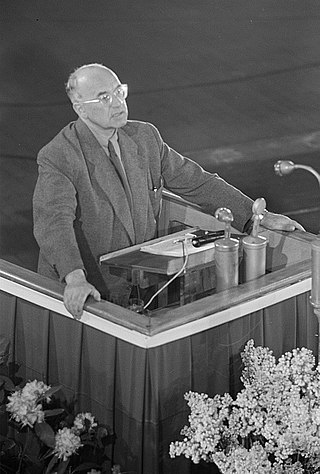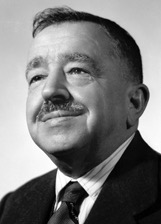Related Research Articles

Gustáv Husák was a Czechoslovak politician who served as the long-time First Secretary of the Communist Party of Czechoslovakia from 1969 to 1987 and the President of Czechoslovakia from 1975 to 1989.

Janusz Jędrzejewicz was a Polish politician and educator, a leader of the Sanacja political group, and 24th Prime Minister of Poland from 1933 to 1934.

Louis Joseph Maria Beel was a Dutch politician of the Roman Catholic State Party (RKSP) and later co-founder of the Catholic People's Party (KVP) and jurist who served as Prime Minister of the Netherlands from 3 July 1946 until 7 August 1948 and from 22 December 1958 until 19 May 1959.

Johannes Robert Becher was a German politician, novelist, and poet. He was affiliated with the Communist Party of Germany (KPD) before World War II. At one time, he was part of the literary avant-garde, writing in an expressionist style.

Seshadri Srinivasa Iyengar CIE, also seen as Sreenivasa Iyengar and Srinivasa Ayyangar, was an Indian lawyer, freedom-fighter and politician from the Indian National Congress. Iyengar was the Advocate-General of Madras Presidency from 1916 to 1920. He also served as a member of the bar council from 1912 to 1920, the law member of Madras Presidency from 1916 to 1920 and as the president of the madras province Swarajya Party faction of the Indian National Congress from 1923 to 1930. Srinivasa Iyengar was the son-in-law of renowned lawyer and first Indian Advocate-general of Madras, Sir Vembaukum Bhashyam Aiyangar. Iyengar's followers called him Lion of the South.
George Joseph Folsey, A.S.C., was an American cinematographer who worked on 162 films from 1919 to his retirement in 1976.

Karl Steinhoff was a Minister-president of the German state of Brandenburg, then part of East Germany, and later served as East Germany's Minister of the Interior.
Socialist Unity Party was a left-wing political party in Finland. The SYP was founded in March 1946 by socialists working inside the communist-dominated Finnish People's Democratic League (SKDL). Most of the founders were former members of the Social Democratic Party of Finland (SDP). The SYP had many known politicians in its ranks but it never became a mass party. In 1955, the party split from the SKDL and was disestablished soon afterwards.

Brynjólfur Bjarnason was an Icelandic communist politician and philosopher.

Sir Ronald Wilberforce Allen was an English lawyer and Liberal politician.

The background of the occupation of the Baltic states covers the period before the first Soviet occupation on 14 June 1940, stretching from independence in 1918 to the Soviet ultimatums in 1939–1940. Lithuania, Latvia, and Estonia gained independence in the aftermath of the Russian revolutions of 1917 and the German occupation which in the Baltic countries lasted until the end of World War I in November 1918. All three countries signed non-aggression treaties with the Soviet Union in the 1920s and 1930s. Despite the treaties, in the aftermath of the 1939 German–Soviet pact, Estonia, Latvia and Lithuania were occupied, and thereafter forcibly incorporated into the Soviet Union, in 1940.

Vicente Gregorio Baltazar Lava Sr. was a Filipino chemist who supported efforts toward economic independence for the Philippines and later became a leader in the communist resistance against the Japanese occupation of the Philippines.

The League of Socialist Youth of Yugoslavia (SSOJ) was the youth movement, member organisation of the Socialist Alliance of Working People of Yugoslavia (SSRNJ). Membership stood at more than 3.6 million individuals in 1983. It was originally established as the League of Communist Youth of Yugoslavia (SKOJ) on 10 October 1919 and retained that name until 1948. Although it was banned just two years after its establishment and at times ruthlessly prosecuted, it continued to work clandestinely and was an influential organization among revolutionary youth in the Kingdom of Yugoslavia, and consequently became a major organizer of Partisan resistance to Axis occupation and local Quisling forces. After World War II, SKOJ became a part of a wider organization of Yugoslav youth, the People's Youth of Yugoslavia, which later became the League of Socialist Youth of Yugoslavia.
Hermann Budzislawski was a German journalist with a particular focus on economics and politics, who used the pseudonyms Hermann Eschwege and Donald Bell. As a young man in the 1930s, he came to prominence as editor in chief of the political weekly magazine Die Weltbühne during the publication's period in exile. After 1945, he returned from a period of several years in New York City to resume his journalistic work and to become a radio commentator with Mitteldeutscher Rundfunk, based in Leipzig, where he also now pursued a successful career as a professor of media sciences at the university.

Giuseppe Romita was an Italian socialist politician. He served several times as a cabinet minister and member of the Italian Parliament.
Ernst Ossian Soravuo, surname until 1926 Sandström was a Finnish diplomat.

Eino Oskari Pekkala was a Finnish lawyer and politician. He was a member of the Parliament of Finland, representing the Socialist Electoral Organisation of Workers and Smallholders 1927–1930 and the Finnish People's Democratic League 1945–1948. In the 1920−1930s, Pekkala was twice in prison for his political activities, and he was even kidnapped by the fascist Lapua Movement in 1930. As the political situation in Finland changed after the World War II, Pekkala was the Minister of Education 1945–1946, and the Minister of Justice 1946–1948.

Yrjö Oskar Ruutu was a Finnish social scientist and politician. Ruutu was the first principal of the School of Social Sciences 1925–1932, 1935–1945 and 1949–1953, and the first Finnish professor of International relations 1949–1954. Ruutu was the first in Finland to defend his doctoral thesis on social sciences and wrote the first Finnish presentation on international relations as a science. He was also the head of the National Board of Education 1945–1950.
Eino Alfred Tainio was a Finnish printer, politician and member of the Parliament of Finland, the national legislature of Finland. A member of the Communist Party of Finland (SKP) and the Finnish People's Democratic League (SKDL), he represented Lapland Province between April 1945 and March 1970. Prior to being elected, he was imprisoned for twelve years for political reasons.
References
- ↑ "Hiitonen, Ensio". Uppslagsverket. Svenska folkskolans vänner. Archived from the original on 24 April 2015. Retrieved 24 April 2015.